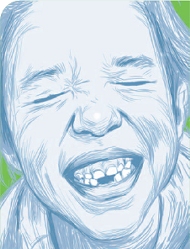 Dental emergencies can be avoided by taking some simple precautions, such as wearing a mouth guard during sports and recreation and staying away from hard food such as candy that may crack a tooth. Accidents do happen however, and it is important to know what actions to take immediately. Injuries to the mouth may include teeth that are knocked out (avulsed), forced out of position and loosened (extruded) or fractured. In addition, lips, gums or cheeks can be cut. Oral injuries are often painful and should be treated by a dentist as soon as possible.
Dental emergencies can be avoided by taking some simple precautions, such as wearing a mouth guard during sports and recreation and staying away from hard food such as candy that may crack a tooth. Accidents do happen however, and it is important to know what actions to take immediately. Injuries to the mouth may include teeth that are knocked out (avulsed), forced out of position and loosened (extruded) or fractured. In addition, lips, gums or cheeks can be cut. Oral injuries are often painful and should be treated by a dentist as soon as possible.
What do I when a tooth is knocked out?
Immediately call your dentist for an emergency appointment. Handle the tooth by the crown, not the root. Touching the root (the part of the tooth below the gum) can damage cells necessary for bone re-attachment. Gently rinse the tooth in water to remove dirt. Do not scrub. Place the clean tooth in your mouth between the cheek and gum to keep it moist. It is important not to let the tooth dry out. If it is not possible to store the tooth in the mouth of the injured person, wrap the tooth in a clean cloth or gauze and immerse in milk or saline solution.
What do I do if the tooth is pushed out of position?
Attempt to reposition the tooth to its normal alignment using very light finger pressure, but do not force the tooth. Bite down to keep the tooth from moving. The dentist may splint the tooth in place to the two healthy teeth next to the loose tooth.
What about when the tooth is fractured?
Rinse mouth with warm water and use an ice pack or cold compress to reduce swelling. Take ibuprofen, not aspirin, for pain. Minor fractures can be smoothed by your dentist with a sandpaper disc or simply left alone. Restorative procedures can also be done to fix the tooth. In either case, treat the tooth with care for several days. Moderate fractures include damage to the enamel, tissue and/or pulp. If the pulp is not permanently damaged, the tooth may be restored with a full permanent crown. If pulp damage does occur, further dental treatment will be required. Severe fractures often mean a traumatized tooth with slim chance of recovery.
What should I do when the tissue of my mouth is injured?
Injuries to the inside of the mouth include tears, puncture wounds and lacerations to the cheek, lips or tongue. The wound should be cleaned right away with warm water, and the injured person taken to a hospital emergency room for the necessary care. Bleeding from a tongue laceration can be reduced by pulling the tongue forward and using gauze to place pressure on the wound.
Can I somehow prepare for dental emergencies?
Yes, by packing an emergency dental kit including:
- Dentist’s phone numbers (home and office)
- Saline solution
- Handkerchief
- Gauze
- Small container with lid
- Ibuprofen (Not aspirin. Aspirin is an anti-coagulant, which may cause excessive bleeding in a dental emergency.)